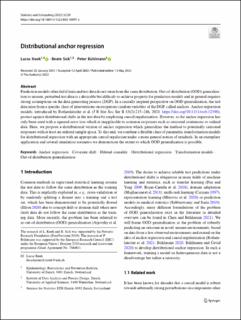Please use this identifier to cite or link to this item:
https://doi.org/10.21256/zhaw-27459| Publication type: | Article in scientific journal |
| Type of review: | Peer review (publication) |
| Title: | Distributional anchor regression |
| Authors: | Kook, Lucas Sick, Beate Bühlmann, Peter |
| et. al: | No |
| DOI: | 10.1007/s11222-022-10097-z 10.21256/zhaw-27459 |
| Published in: | Statistics and Computing |
| Volume(Issue): | 32 |
| Issue: | 3 |
| Page(s): | 39 |
| Issue Date: | 2022 |
| Publisher / Ed. Institution: | Springer |
| ISSN: | 0960-3174 1573-1375 |
| Language: | English |
| Subjects: | Anchor regression; Covariate shift; Diluted causality; Distributional regression; Out-of-distribution generalization; Transformation models |
| Subject (DDC): | 510: Mathematics |
| Abstract: | Prediction models often fail if train and test data do not stem from the same distribution. Out-of-distribution (OOD) generalization to unseen, perturbed test data is a desirable but difficult-to-achieve property for prediction models and in general requires strong assumptions on the data generating process (DGP). In a causally inspired perspective on OOD generalization, the test data arise from a specific class of interventions on exogenous random variables of the DGP, called anchors. Anchor regression models, introduced by Rothenhäusler et al. (J R Stat Soc Ser B 83(2):215-246, 2021. 10.1111/rssb.12398), protect against distributional shifts in the test data by employing causal regularization. However, so far anchor regression has only been used with a squared-error loss which is inapplicable to common responses such as censored continuous or ordinal data. Here, we propose a distributional version of anchor regression which generalizes the method to potentially censored responses with at least an ordered sample space. To this end, we combine a flexible class of parametric transformation models for distributional regression with an appropriate causal regularizer under a more general notion of residuals. In an exemplary application and several simulation scenarios we demonstrate the extent to which OOD generalization is possible. |
| URI: | https://digitalcollection.zhaw.ch/handle/11475/27459 |
| Fulltext version: | Published version |
| License (according to publishing contract): | CC BY 4.0: Attribution 4.0 International |
| Departement: | School of Engineering |
| Organisational Unit: | Institute of Data Analysis and Process Design (IDP) |
| Appears in collections: | Publikationen School of Engineering |
Files in This Item:
| File | Description | Size | Format | |
|---|---|---|---|---|
| 2022_Kook-Sick-Buehlmann_Distributional-anchor-regression_Statisticsandcomputing.pdf | 2.25 MB | Adobe PDF |  View/Open |
Show full item record
Kook, L., Sick, B., & Bühlmann, P. (2022). Distributional anchor regression. Statistics and Computing, 32(3), 39. https://doi.org/10.1007/s11222-022-10097-z
Kook, L., Sick, B. and Bühlmann, P. (2022) ‘Distributional anchor regression’, Statistics and Computing, 32(3), p. 39. Available at: https://doi.org/10.1007/s11222-022-10097-z.
L. Kook, B. Sick, and P. Bühlmann, “Distributional anchor regression,” Statistics and Computing, vol. 32, no. 3, p. 39, 2022, doi: 10.1007/s11222-022-10097-z.
KOOK, Lucas, Beate SICK und Peter BÜHLMANN, 2022. Distributional anchor regression. Statistics and Computing. 2022. Bd. 32, Nr. 3, S. 39. DOI 10.1007/s11222-022-10097-z
Kook, Lucas, Beate Sick, and Peter Bühlmann. 2022. “Distributional Anchor Regression.” Statistics and Computing 32 (3): 39. https://doi.org/10.1007/s11222-022-10097-z.
Kook, Lucas, et al. “Distributional Anchor Regression.” Statistics and Computing, vol. 32, no. 3, 2022, p. 39, https://doi.org/10.1007/s11222-022-10097-z.
Items in DSpace are protected by copyright, with all rights reserved, unless otherwise indicated.